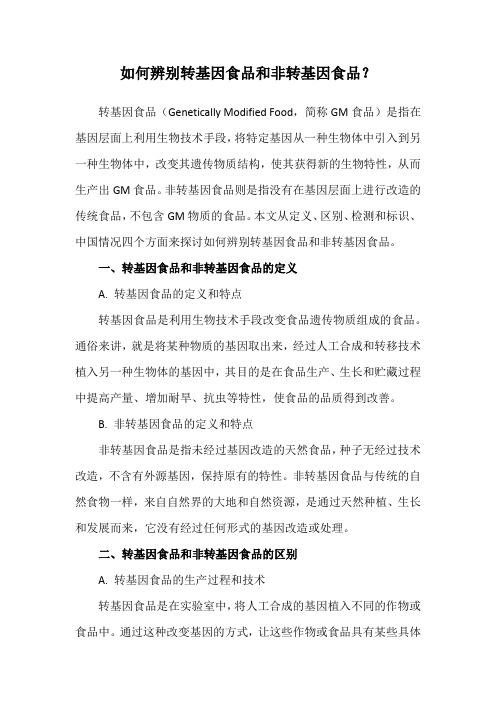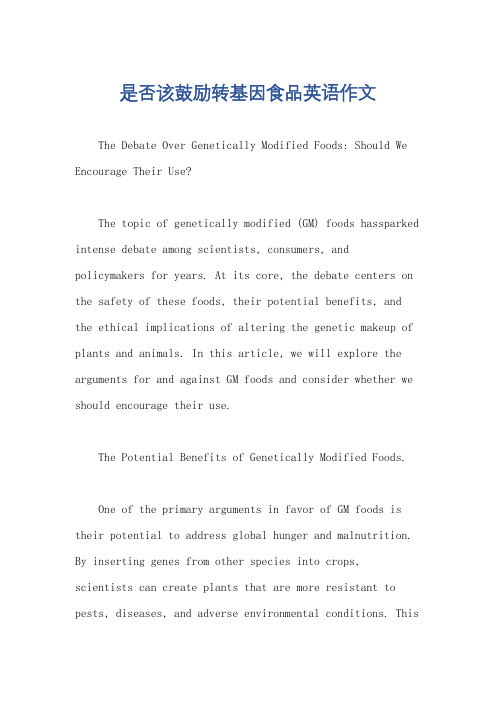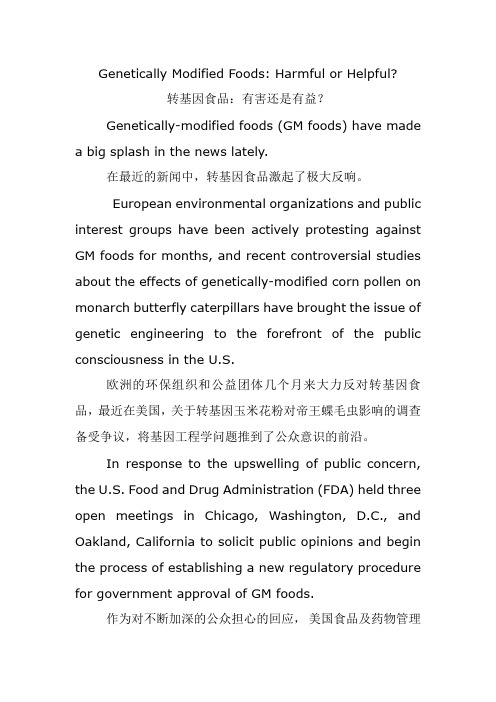GM (genetic modification) foods and safety
如何辨别转基因食品和非转基因食品?

如何辨别转基因食品和非转基因食品?转基因食品(Genetically Modified Food,简称GM食品)是指在基因层面上利用生物技术手段,将特定基因从一种生物体中引入到另一种生物体中,改变其遗传物质结构,使其获得新的生物特性,从而生产出GM食品。
非转基因食品则是指没有在基因层面上进行改造的传统食品,不包含GM物质的食品。
本文从定义、区别、检测和标识、中国情况四个方面来探讨如何辨别转基因食品和非转基因食品。
一、转基因食品和非转基因食品的定义A. 转基因食品的定义和特点转基因食品是利用生物技术手段改变食品遗传物质组成的食品。
通俗来讲,就是将某种物质的基因取出来,经过人工合成和转移技术植入另一种生物体的基因中,其目的是在食品生产、生长和贮藏过程中提高产量、增加耐旱、抗虫等特性,使食品的品质得到改善。
B. 非转基因食品的定义和特点非转基因食品是指未经过基因改造的天然食品,种子无经过技术改造,不含有外源基因,保持原有的特性。
非转基因食品与传统的自然食物一样,来自自然界的大地和自然资源,是通过天然种植、生长和发展而来,它没有经过任何形式的基因改造或处理。
二、转基因食品和非转基因食品的区别A. 转基因食品的生产过程和技术转基因食品是在实验室中,将人工合成的基因植入不同的作物或食品中。
通过这种改变基因的方式,让这些作物或食品具有某些具体的特性,如增加耐旱性、抗虫性、快速生长等。
而非转基因食品则是在自然条件下种植、生长和发展而来的,不需要任何形式的人工处理或改变。
B. 转基因食品和非转基因食品的组成成分转基因食品会在其组成成分中添加外源基因,这些基因会改变食品品质,提高产量等,从而增加其价值。
而非转基因食品只含有天然物质,未添加任何外源基因,其品质较为稳定,更容易受到消费者的信任。
C. 转基因食品和非转基因食品对人体健康的影响转基因食品可能对人体健康产生某些副作用,但科学家们一直在探讨和研究这些食品的安全性。
是否该鼓励转基因食品英语作文

是否该鼓励转基因食品英语作文The Debate Over Genetically Modified Foods: Should We Encourage Their Use?The topic of genetically modified (GM) foods hassparked intense debate among scientists, consumers, and policymakers for years. At its core, the debate centers on the safety of these foods, their potential benefits, and the ethical implications of altering the genetic makeup of plants and animals. In this article, we will explore the arguments for and against GM foods and consider whether we should encourage their use.The Potential Benefits of Genetically Modified Foods.One of the primary arguments in favor of GM foods is their potential to address global hunger and malnutrition. By inserting genes from other species into crops,scientists can create plants that are more resistant to pests, diseases, and adverse environmental conditions. Thiscould lead to higher yields and more reliable food sources in areas where crop failure is common.Additionally, GM foods can be engineered to contain higher levels of nutrients. For example, scientists have developed GM rice that is enriched with beta-carotene, a precursor to vitamin A, which can help combat vitamin A deficiency in developing countries. Similarly, GM crops can be designed to have lower levels of harmful substances, such as toxins or allergens, making them safer for human consumption.Concerns About the Safety and Ethics of Genetically Modified Foods.Despite the potential benefits, there are significant concerns about the safety and ethics of GM foods. One major concern is the long-term ecological impact of introducing genetically modified organisms (GMOs) into the environment. GM crops could interact with wild relatives and create new, potentially invasive, species. Furthermore, the long-term effects of consuming GM foods on human health are still notfully understood.Ethical concerns also arise from the practice ofgenetic modification. Some argue that playing God byaltering the genetic code of plants and animals isunethical and goes against the natural order. Others fear that GM foods may lead to the loss of biodiversity as farmers rely increasingly on a few genetically modified varieties rather than maintaining a diversity of crop types.The Role of Regulation and Consumer Choice.In addressing these concerns, a balanced approach is needed. Strict regulatory frameworks should ensure that GM foods are safe for human consumption and environmentally responsible. This includes rigorous testing and monitoringof GM crops to assess their impact on human health, ecosystems, and biodiversity.Moreover, consumers should have the right to choose whether they want to consume GM foods or not. Labeling laws that clearly indicate whether a product contains GMOs canhelp consumers make informed decisions about their food purchases. This approach respects consumer preferences and promotes transparency in the food supply chain.Conclusion.The debate over genetically modified foods is complex and multifaceted. While GM foods have the potential to address global hunger and malnutrition, there are also concerns about their safety, environmental impact, and ethical implications. A balanced approach that combines strict regulation, consumer choice, and ongoing research is needed to ensure that GM foods are safe, sustainable, and beneficial for society.Encouraging the use of GM foods is not a simple yes or no question. Instead, it requires a nuanced understanding of the science, social implications, and consumer preferences involved. By taking a balanced and responsible approach, we can harness the potential benefits of GM foods while minimizing their risks and ensuring that they serve the best interests of society and the environment.。
转基因技术对农作物抗病性的改善

转基因技术对农作物抗病性的改善转基因技术(Genetic Modification,GM)作为现代农业领域的一项重要技术,给农作物培育带来了革命性的变革。
其中一个显著的改善是提高了农作物的抗病性。
通过插入外源基因,转基因技术使得农作物能够抵抗原有品种所容易受到的病原体及其害虫的威胁。
本文将就这一问题展开论述,介绍转基因技术在农作物抗病性改善方面的应用以及相关的利与弊。
一、转基因技术在农作物抗病性改善方面的应用1.1 抗病基因的导入通过转基因技术,科学家们可以将抗病基因从一种植物或其他生物体插入到目标作物中。
这些抗病基因可能来自于同一物种中已经具备抗病性的品种,也有可能是从其他物种中获得。
不同的抗病基因可以对应不同的病原体,因此通过插入多个抗病基因,农作物能够获得更强大的抗病能力。
1.2 病毒抗性的改善转基因技术还可以改善农作物对病毒的抗性。
病毒是常见的病原体,对农作物造成严重危害。
科学家通过插入能够抵御病毒侵袭的基因,使得农作物增强了对病毒的防御机制。
例如,转基因棉花通过插入一种叫做Bt(Bacillus thuringiensis)的细菌中的基因,使得棉花能够抵制棉铃虫和叶部蠕虫等害虫的侵扰。
1.3 内源抗病性因子的增加转基因技术还可以通过增加农作物内源抗病性因子的表达来改善抗病性。
这些内源抗病性因子是天然存在于农作物中的,但数量有限或者无法在关键时期得到表达。
通过转基因技术,科学家可以调控相关基因的表达,使得这些抗病性因子能够在需要的时候得到表达,从而提高农作物的抗病性。
二、转基因技术改善农作物抗病性的利与弊2.1 利:提高农作物产量和品质转基因技术可以提高农作物的抗病性,降低病害导致的产量损失。
同时,抗病农作物能够减少对杀虫剂等化学农药的使用,有利于环境保护。
此外,通过转基因技术改善的农作物还可以提高品质,满足人们对优质农产品的需求。
2.2 利:增加农作物的耐逆性转基因技术不仅可以提高农作物的抗病性,还能增加其抵御其他逆境的能力,如干旱、盐碱等。
GM food

转基因食品GM food[ 2012-03-13 16:50 ]特别推荐:2012两会双语直通车近日,著名农业专家、“杂交水稻之父”袁隆平表示,在粮食生产上,要采取严格的措施监管转基因技术的应用,在没有实验结果作为根据的前提下,对转基因食品生产和销售的安全性“要慎重”。
请看新华网的报道:Application of transgenic technology should be restricted on all food production and the government should take a "scientific and prudent attitude" toward genetically modified (GM) food, Yuan said.袁隆平表示,所有的粮食生产都应该限制转基因技术的应用,政府对转基因食品应采取“科学谨慎的态度”。
文中的genetically modified (GM) food就是指“转基因食品”,genetically modified 就是指“转基因的”,是指利用genetic engineering technology(基因工程技术)/transgenic technology(转基因技术)在物种基因组中嵌入了foreign gene(非同钟,外源基因)的食品,包括转基因植物食品、转基因动物食品和转基因微生物食品。
Transgenosis(转基因)作为一种新兴的biotechnology(生物技术)手段,它的不成熟和不确定性,必然使得转基因食品的安全性成为人们关注的焦点。
两会前夕,国务院法制办公布了由国家发改委、国家粮食局会同有关部门起草的《粮食法征求意见稿》,其中第十二条特别提出,“transgenic grain seeds(转基因粮食种子)的科研、试验、生产、销售、进出口应当符合国家有关规定。
任何单位和个人不得擅自在principal grain cultivars(主要粮食品种)上应用转基因技术。
Genetically-Modified-Foods

Genetically Modified Foods: Harmful or Helpful?转基因食品:有害还是有益?Genetically-modified foods (GM foods) have made a big splash in the news lately.在最近的新闻中,转基因食品激起了极大反响。
European environmental organizations and public interest groups have been actively protesting against GM foods for months, and recent controversial studies about the effects of genetically-modified corn pollen on monarch butterfly caterpillars have brought the issue of genetic engineering to the forefront of the public consciousness in the U.S.欧洲的环保组织和公益团体几个月来大力反对转基因食品,最近在美国,关于转基因玉米花粉对帝王蝶毛虫影响的调查备受争议,将基因工程学问题推到了公众意识的前沿。
In response to the upswelling of public concern, the U.S. Food and Drug Administration (FDA) held three open meetings in Chicago, Washington, D.C., and Oakland, California to solicit public opinions and begin the process of establishing a new regulatory procedure for government approval of GM foods.作为对不断加深的公众担心的回应,美国食品及药物管理局(FDA)在分别在芝加哥,华盛顿特区和加州的奥克兰市召开了三场听证会,征求公众意见,开始建立了对政府批准转基因食物的新监管。
GM_foods

GM foods转基因食品Well, good afternoon, ladies and gentlemen. I’d like to talk with you this afternoon about genetically modified foods, GM foods, and among other things put out some points for and against their use by human beings. 女士们,先生们,下午好。
今天下午我想和你谈谈转基因食品,转基因食品,以及其他一些问题,并提出了一些观点和反对的观点人类Ok. Well, it’s a rather technical subject. Don’t be put off by the language. It’s becoming more and more familiar because this is a hotly debated issue. But let’s look first at the structure of this talk. We’ll have a look at the so-called gene revolution, but very much in outline., go on to have look at some examples of genetically modified foods, look at some arguments for their use, and some against, and I’ll add one or two comments, mainly about assumptions in some of t he arguments to suggest a line of approach, and I’ll add something by way of, not so much a conclusion, as a final comment on all this. 好啊嗯,这是一个相当技术性的课题。
gmfood英语作文

gmfood英语作文In recent years, genetically modified (GM) food has become a topic of heated debate. Advocates argue that GM technology could revolutionize agriculture by increasing crop yields, improving resistance to pests and diseases, and evenenhancing nutritional content. However, critics raiseconcerns about the potential environmental and health risks associated with GM crops.Advantages of GM Food1. Increased Yields: GM crops are engineered to grow faster and larger, which can lead to higher yields. This is particularly beneficial in regions where food scarcity is a significant issue.2. Pest and Disease Resistance: By incorporating genes that confer resistance to pests and diseases, GM crops can reduce the need for chemical pesticides, which is beneficial forboth the environment and human health.3. Nutritional Enhancement: Some GM foods are designed tohave enhanced nutritional profiles. For example, the development of Golden Rice, which is fortified with vitamin A, aims to combat vitamin A deficiency in developing countries.4. Climate Resilience: GM technology can create crops thatare more tolerant to extreme weather conditions, such asdrought or floods, ensuring food security in the face of climate change.Challenges and Concerns1. Environmental Impact: There are concerns that GM crops could cross-pollinate with wild relatives, leading to the spread of modified genes into the wild, potentiallydisrupting ecosystems.2. Health Risks: Some studies suggest that GM foods could have unforeseen health consequences. However, the scientific community remains divided on this issue, with many asserting that GM foods are as safe as their non-GM counterparts.3. Ethical Considerations: The use of GM technology raises ethical questions about the manipulation of nature and the potential for unintended consequences.4. Economic Implications: The control of GM seeds by a few large corporations can lead to concerns about monopolistic practices and the impact on small-scale farmers.ConclusionThe debate surrounding GM food is complex and multifaceted. While the technology holds promise for addressing global food security and improving agricultural practices, it is crucial to proceed with caution. Rigorous scientific research, transparent regulatory frameworks, and public engagement are essential to ensure that the benefits of GM food are realizedwithout compromising the environment or human health.This essay provides a balanced view of the topic, highlighting both the potential benefits and the challenges associated with GM food. It encourages readers to consider the issue from multiple perspectives and to engage in informed discussions about the future of agriculture.。
转基因食品的危害英语总结

转基因食品的危害英语总结GM (genetically modified) foods are a controversial topic that has sparked debates and concerns worldwide. While proponents argue that these foods are safe and can address food security issues, there are several potential risks and hazards associated with GM foods that cannot be overlooked.Firstly, one of the main concerns about GM foods is their impact on human health. Many people worry about the potential allergenicity, toxicity, and long-term health effects of consuming genetically modified organisms (GMOs). A key issue is the possibility of introducing new allergens through genetic modification, as foreign genes may produce proteins that could trigger allergic reactions in susceptible individuals. Additionally, the insertion of foreign genes into a plant's DNA could result in the production of harmful toxins, making these GM foods potentially toxic to humans.Secondly, the environmental impact of GM crops is a significant concern. GM crops are often engineered to be herbicide-tolerant or insect-resistant. This has led to the extensive use of herbicides and pesticides in agriculture, which can have adverse effects on the environment and biodiversity. The excessive use of herbicides can result in the development of resistant weed populations, leading to the need for even stronger chemicals. Moreover, GM crops engineered to produce their own insecticides have raised concerns about the potential harm to non-target organisms, such as beneficial insects and pollinators.Furthermore, the socio-economic implications of GM crops cannotbe ignored. The majority of GM crops are patented by biotechnology companies, which can have negative implications for farmers in developing countries. These farmers become dependent on purchasing expensive GM seeds and associated inputs, leading to increased production costs and reduced access to traditional seed varieties. This can perpetuate a cycle of poverty and dependence, as small-scale farmers are marginalized and lose control over their agricultural practices.Additionally, there are concerns regarding the potential for gene flow and genetic contamination. Despite efforts to prevent cross-pollination and seed spread, GM crops have the ability to spread their genes to wild relatives and non-GM crops through pollen or seed dispersal. This can have unintended consequences, such as the development of herbicide-resistant weed populations or genetic contamination of organic crops, compromising their integrity and marketability.Lastly, the lack of transparency and inadequate regulation surrounding GM foods is a major cause for concern. Many consumers are unaware of the presence of GM ingredients in their food due to inadequate labeling laws. This denies individuals the right to make informed choices about the types of food they wish to consume. Furthermore, regulatory frameworks in many countries are often insufficient to adequately assess the potential risks associated with GM technology. Stronger and more transparent regulations are necessary to ensure the safety of GM foods and protect consumer rights.In conclusion, while proponents argue that GM foods have thepotential to address food security issues, there are significant risks and hazards associated with their consumption. Concerns regarding human health, environmental impact, socio-economic implications, genetic contamination, and inadequate regulation cannot be ignored. It is crucial to consider these concerns and thoroughly evaluate the long-term effects of GM foods before widespread adoption and consumption.。
- 1、下载文档前请自行甄别文档内容的完整性,平台不提供额外的编辑、内容补充、找答案等附加服务。
- 2、"仅部分预览"的文档,不可在线预览部分如存在完整性等问题,可反馈申请退款(可完整预览的文档不适用该条件!)。
- 3、如文档侵犯您的权益,请联系客服反馈,我们会尽快为您处理(人工客服工作时间:9:00-18:30)。
GM (genetic modification) foods and safety
Good morning everyone,
Do you know that GM food has been part of our life? Do you know that the government has approved 6 GM crops grown commercially? I don’t know this situation until I prepared for the speech.
So, what is GM? GM is a technology that inserting genes derived from an organism whose DNA has been altered to another organism.If we eat GM food, The GM food genes can enter the human body.
As we know, GM technology can improve outputs. The GM crops can decrease disease and need fewer chemicals. But experiments on animals have proved that GM foods have the potential to cause serious health damage even in a very short period. These tests show GM foods can harm animals' reproductive systems and raise infant mortality rates. GM foods' gene modification could take generations to suit the human body.
At present, China has approved 6 GM crops grown commercially, including peppers, tomatoes, potatoes, corn and rice. China has been the world's first country that approves to plant GM staple food.
Yet the core question concerning the GM rice issue is not whether it is safe but whether people's rights will be honored, especially their right to choose what they eat.Next comes people's right to know. In fact, we don’t have the deserve right to choose what we eat, GM or not GM, and we don’t have the right to know whether we eat is GM.
That’s all. Thank you!
Q1: what are other harms of GM foods except the harms to human body?
GM foods can cause damage to the soil, which is more dangerous than chemical pollution. It can also cause the chaos to ecosystem.
Q2: The safety of GM foods is uncertain. Do you think we should forbid GM foods?
NO, I don’t think so. Because GM can really improve outputs. The government should let we know which foods is GM, and the supermarkets should mark the foods is GM or not.。
